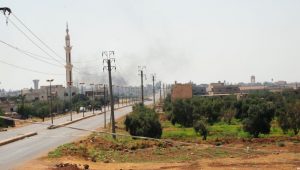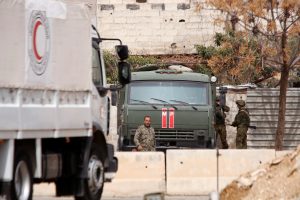
By Angus McDowall and Tulay Karadeniz
BEIRUT/ANKARA (Reuters) – Russian and Syrian jets hammered a major rebel stronghold on Tuesday, a war monitor said, days before leaders of Russia, Iran and Turkey meet to discuss an expected Syrian government offensive that could spark a humanitarian disaster.
The warplanes bombarded countryside around Jisr al-Shughour on the western edge of the rebel enclave of Idlib after weeks of lull, killing 13 civilians but no fighters, according to the Syrian Observatory for Human Rights and a rebel source.
For President Bashar al-Assad, the defeat of rebels in the northwestern province would mean breaking the last major stronghold of active military opposition to his rule, though other large areas also remain beyond his control.
Since Russia’s entry into the war on his side in 2015, Assad and his other close allies, Iran and a group of regional Shi’ite militias it backs, have forced the rebels from a succession of bastions including Aleppo, Eastern Ghouta and Deraa.
A Syrian government minister said the siege of Idlib would probably be resolved by force. “Until now, military action is more likely than reconciliations,” Reconciliation Minister Ali Haidar told Russia’s Arabic-language Sputnik news agency.
Damascus uses the term “reconciliation” for the negotiated rebel surrenders that have taken place in some areas.
“Idlib is different from other regions because of the large numbers of fighters,” Haidar said. “However we cannot say there is no gateway to reconciliation.”
Half of Idlib’s 3 million people have already fled there from their homes in other parts of Syria, according to the United Nations, and any offensive there threatens new displacement and human misery.
It could also spark a wider confrontation with Turkey, a supporter of the rebels, whose army has set up observation posts along the Idlib front lines to deter fighting.
Turkey’s Hurriyet daily reported that Turkish armed forces were reinforcing the Idlib border with M60 tanks, and Reuters television filmed a convoy heading towards the border.
Tuesday’s air strikes came hours after U.S. President Donald Trump warned Assad and his allies not to “recklessly attack” Idlib, saying that hundreds of thousands might die.
“HUMAN SHIELDS”
The Kremlin on Tuesday dismissed his comments, describing Idlib, where jihadist insurgent factions dominate, as a “nest of terrorism”. Spokesman Dmitry Peskov added: “We know that Syria’s armed forces are preparing to resolve this problem.”
Iran echoed that theme. “Terrorist groups [in Idlib] have mixed with the people,” said Abbas Araqchi, deputy foreign minister, according to the Islamic Republic News Agency.
“They are using people as human shields.”
Idlib’s dominant rebel faction is Tahrir al-Sham, a jihadist alliance spearheaded by al Qaeda’s former official affiliate in Syria, the Nusra Front, though other insurgent groups are also present.
Last week the U.N. envoy to Syria, Staffan de Mistura, said the Nusra Front and al Qaeda, both of which the international body designates as terrorists, had an estimated 10,000 fighters in Idlib.
A top U.S. general estimated there were 20,000-30,000 militants in Idlib, but said if there were major military operations “we can expect humanitarian catastrophe”, and urged operations that mitigated the risks to civilians.
On Tuesday de Mistura said ongoing talks between Russia and Turkey held the key to resolving the fate of Idlib without a bloodbath. He said he had heard reports that Damascus had set a Sept. 10 deadline for diplomacy to work before attacking.
Turkey fears a major assault on Idlib could send a new wave of refugees towards its border, and wants to maintain a “de-escalation agreement” that it struck with Russia and Iran last year.
It has staged two major incursions into Syria, creating a buffer zone along its border in an area north of Aleppo that adjoins Idlib, where it has set up a local administration alongside Syrian rebel groups.
Foreign Minister Mevlut Cavusoglu said Turkey was discussing joint action with Russia to target terrorist groups in Idlib while avoiding a full-scale offensive. Ankara last week added Tahrir al-Sham to its list of designated terrorist groups.
GRAPHIC: Syrian army prepares assault on Idlib – https://tmsnrt.rs/2NHAqh3
PRETEXT FOR ATTACK?
“We went to Moscow with our defense minister and intelligence chief. Now talks are ongoing between our soldiers, intelligence agencies and foreign ministries about what kind of steps could be taken,” he said in Ankara late on Monday.
Ankara has said the presence of radical groups in Idlib is being used a pretext for a military operation. When he was in Russia in late August, Cavusoglu said “we have to differentiate terrorists from other people”, but added that it was also important to eliminate Russia’s concerns.
Iran’s Foreign Minister Mohammad Javad Zarif, on a visit to Syria, told Iranian state television: “Our efforts are for … the exit of terrorists from Idlib to be carried out with the least human cost.”
He and Peskov said Idlib would be a major subject of discussion at the Sept. 7 summit meeting between Russia’s Vladimir Putin, Turkey’s Tayyip Erdogan and Iran’s Hassan Rouhani.
Tuesday’s strikes come after three weeks without Russian air raids in Idlib, though the Syrian military has kept up shelling and some aerial bombardment.
Last week a source close to Damascus said the government was preparing a phased assault that would initially target the areas in the south and west of the rebel enclave. That would bring Assad close to reclaiming the major strategic prize in the region, two arterial highways running to Aleppo.
Even a staggered offensive like that would involve fighting around Turkish observation posts, potentially triggering a new escalation in an already complex war.
State news agency SANA said Syrian air defenses brought down Israeli rockets on Tuesday.
“Air defenses downed a number of rockets fired by the Israeli enemy in the Wadi al-Uyoun area in the Hama countryside,” it said.
(Reporting by Angus McDowall and Lisa Barrington in Beirut, Tulay Karadeniz in Ankara, Babak Dehghanpisheh and Tom Miles in Geneva, Tom Balmforth in Moscow, Phil Stewart in Athens and Suleiman al-Khalidi in Amman; writing by Angus McDowall; editing by Andrew Roche)











